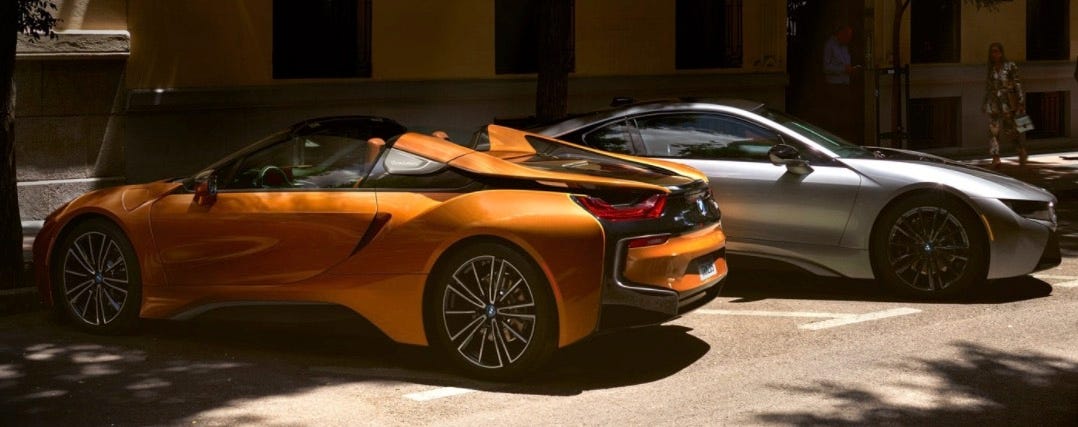BMW ties with Northvolt for batteries to boost EV line
BMW and Volkswagen both neck-and-neck with Tesla in European market

Above, the BMW i8. Photo: BMW.
By Elizabeth Hearst
(Elizabeth Hearst is a journalist based in Ireland and a graduate of Dublin City University's Masters of Journalism. She has interned with the Racing Post — the UK and Ireland's top horse-racing newspaper. She has worked for the National Broadcaster RTE at the Irish General Election).
DUBLIN (Callaway Climate Insights) — German luxury car manufacturer BMW (XE:BMW) has signed a multi-billion euro contract for battery cells with Swedish company Northvolt, as European carmakers gear up on electric vehicles to compete with industry leader Tesla.
The long-term contract will see vehicles produced at a fully renewable energy factory under construction in Skellefteå in northern Sweden from 2024. The cost of this project is estimated to be over €2 billion ($2.3 billion).
Andreas Wendt, member of the board of management at BMW, said, “signing this contract is another step towards meeting our growing need for battery cells in the long term.” He said BMW is “systematically driving electrification of its vehicle fleet.”
This electric battery plant will run solely on renewable energy and will be produced by solar and wind energy. BMW’s chairman of the board of management, Oliver Zipse, said “to make an effective contribution to climate protection, we aim to improve our products’ overall environmental balance.” Zipse remarked that this move is a “contractual agreement with our cell manufacturers” to ensure that “only green power is used to produce our fifth-generation battery cells.”
The cost of the project represents the drive for electrification of the BMW fleet with the group currently representing just 4% of total electric vehicle output worldwide, something that BMW executives want to increase.
The market leader in electric vehicles is Elon Musk’s Tesla (TSLA), which accounts for a massive 21% of total global electric vehicles.
Yet European buyers remain faithful to the German conglomerate, with BMW, Volkswagen (VLKAF) and Tesla all sharing the spoils on 10% of the total European market share each.
The German group is set to have 25 fully electrified vehicles in its line-up by 2023 with BMW’s Munich production plant due for a revamp this summer. This refurbishment will see production halted for six weeks while “numerous structural and remodeling measures” are implemented, before the fully electric BMW i4 standard production begins in 2021.
Plant Director Robert Engelhorn spoke about the plans and said: “We are gearing up our Munich plant for the future”. He added that this remodelling will allow the team to “produce vehicles with diesel, petrol and hybrid drive trains, as well as the fully-electric BMW i4, all on the same line.”
Currently the BMW Group produces batteries at three plants, Dingolfing, German; Spartanburg, S.C. and Shenyang in China. In November 2019, BMW ordered more than €10 Billion in car battery cells from Chinese manufacturer CATL and Samsung SDL, headquartered in South Korea.
BMW’s commitment to a green future is clear. The company has made major investments in electric battery production and secured contracts to procure cobalt sustainably from Morocco in a deal estimated to be worth more than €100 million.
In December 2019, the group announced that it had secured a five-year contract with Gangfeng to supply lithium from mines in Australia, in a deal valued at more than €500 million. Following this announcement, Wendt, said “sustainability is an important aspect of our corporate strategy and plays a central role in expanding electromobility.” He added that lithium and other raw materials must be “extracted and processed under ethically responsible conditions.”
The contract signed by BMW and Northvolt is one of the largest of its kind in vehicle manufacturing. In a recent interview with CleanTechnica, Northvolt CEO Peter Carlsson spoke about his beginnings at Tesla, and how Europe has really started to get onboard with electric vehicles. “The EU emissions requirements are coming down very hard and are requiring different types of energy solutions in order to meet the emissions criteria,” he said. He spoke about the increased demand, especially in Northern Europe, and added, “we see a clear sign of people who are thinking about buying their next car and they are really concerned about buying a combustion engine.”
European car manufacturers are scrambling to decrease their average fleet emissions below 95g CO2 per km target set by the European Commission for 2021 onwards. If these emission targets are not reached, car manufacturers will be hit with an excess emissions premium for each car registered, resulting in potential billions of euros in fines.
BMW’s competitors are also stepping up to the mark, with fellow German car giant Volkswagen investing billions in electric car battery manufacturers. In May it was announced that VW had agreed to invest €2.1 billion into two Chinese electric vehicle manufacturers: €1 billion in state-owned manufacturer Anhui Jianghuai Automobile Group and €1.1 billion into electric battery maker Guoxuan High Tech.
Volkswagen has also pledged to invest €450 million into Northvolt in a joint venture which will see a factory built near Wolfsburg, Germany with battery cell production estimated to begin in 2024.
Similarly, Daimler (XE:DAI), the parent group of Mercedes Benz, recently invested €20 billion in electric car battery cells and committed to building two factories at Stuttgart-Untertürkheim; one factory at the company’s Sindelfingen site; and factories in Beijing, Bangkok, Tuscaloosa, Ala. and Jawor, (Poland).
